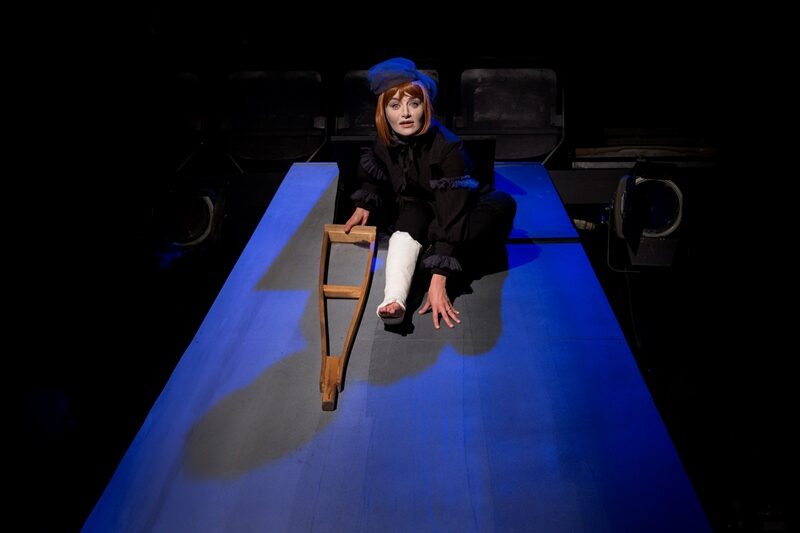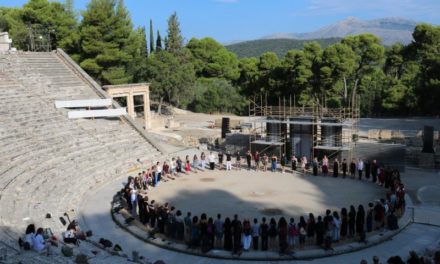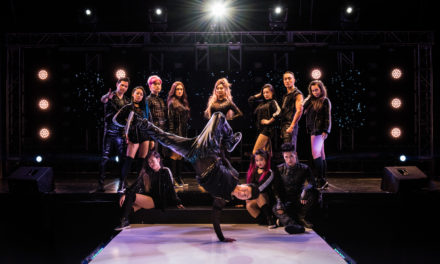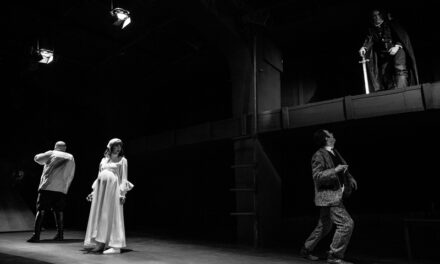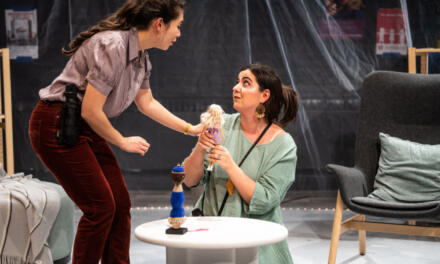About this performance and its director also read Self-Censorship Is a Castration of Ideas: A Conversation with Ruhollah J’afari, Dramaturg and Director of the Play Richard III Will Not Take Place
Farinaz Kavianifar: You’ve been working since the age of sixteen, but from 2010 onwards, you have chosen to work exclusively on the plays of the Romanian-French playwright Matei Vișniec with the Guitī Theatre Group. Please explain this persistence and continuation with Vișniec’s work.
Rūhollah J’afarī: Matei Vișniec is a playwright who writes in a universal style. Vișniec experienced pain in the same way as an Easterner, such as myself, does. He’s not only a storyteller; he also criticizes his environment and even his audience. At the same time that his plays are avant-garde, they are also tied to a set storyline. The events that occur in his plays also occur in Iran, and in other countries around the world. He is an artist with a universal voice. As an Iranian, I find great interest in Vișniec’s work.
FK: A dominant theme in your productions is censorship. What message do you intend to give to the audience at large?
RJ: Whether in the past years of directing my own authored plays, or in the present day, especially in the past decade of working exclusively on the plays of Matei Vișniec, it has always been important to inquire about topics that can create a direct relationship with the citizens that I reside with [in Iran]. In order to fulfill my desire, I select works that carry a universal message; ones that do not create boundaries or limitations in the inquiries and contemplations of the audience. Vișniec lived in a time of hardship: in censorship, eradication of thought and speech, and a radicalism towards both art and the artist. When Vișniec lived in Romania, there was a dictator in power by the name of Nicolae Ceaușescu, who deprived artists, and, of course, citizens, of their independence and freedom. The Ceaușescu government in Romania was a totalitarian regime, which did not permit the spread of a multifaceted voice and viewpoint in society. Ceaușescu believed that his words should be obeyed without question or doubt. Due to this, Ceaușescu feared free-thinking artists, as he knew that such artists would not become captive to his regime and would rise against oppression and arrogance by using their art as a medium to shed light on issues and bring awareness to their society. Therefore, Ceaușescu enforced radicalism in all aspects of his statesmanship to maintain and assert his reign of power. In such an atmosphere, Vișniec was unable to publish his work and was eventually forced out of the country. It should be noted that a free-thinking artist does not allow himself or herself to be imprisoned in a cage for his or her beliefs and ideologies but finds a way to break free and fly. This flight is an act of encouragement for people to break away from the cages of everyday routine and to learn to spread their wings and fly. This is what Vișniec did during Ceaușescu’s time. Thus, it is the duty of both myself, as an individual, and the Guitī Theatre Group not only to read these plays but to analyze and interpret them. It is due to this that we have reached a collective conclusion of performing these plays in Iran. Vișniec’s thought transcends time and space; there is no fixed historic date or venue that it needs to revolve around. With the required dramaturgy, I make an effort to communicate his thought to the Iranian audience, and after a decade of dramaturging and directing his works, I’ve received positive feedback from audiences, and it seems that they have been able to make personal connections with the plays. In my opinion, Vișniec’s work has the capability of being performed internationally, as it currently is.
FK: You’ve previously stated that “art for art” is not sufficient, and in fact, you utilize theatre as not only a cultural but an educational tool. Please expand on how you utilize theatre as a tool for education.
RJ: In order to create an uninterrupted connection with audience members in the world of art, one must act upon three things: research, instruction, and creation. I personally strive to follow this three-sided pyramid in my work. As a university professor, I try to incorporate the theory that I teach into action, which manifests in my dramaturgy and directing. Additionally, when I read a play, my intent is to transmit the questions that the playwright is trying to pose to the audience, and in order to do so both the team and I engage in research of the playwright’s thought and the historical background in which he or she resided. We aim to instruct both the manifest and the hidden language of the playwright’s thought in our performances.
I believe that the act of practice and practice towards creativity can never be eliminated in the formation of theatrical work. Unfortunately, in present-day Iran, theatre groups (especially those belonging to the younger generations) pay less attention to this note and avoid the practice and teamwork that is necessary for production. In the most recent production of the Guitī Theatre Group, Richard III Will Not Take Place, there were daily and continuous rehearsals that would last six to eight hours for the duration of two months, in order for the group to prepare for performances and attain a proper grasp of the play.
Art is not merely decorative. It serves as entertainment but it also leads to inquiry. We cannot eliminate thought and inquiry from the theatre. Regrettably, a number of plays in Iran have tended to shy away from the criteria and standards of theatre and have given in to the desires of the masses and the audience at large. This has led to a focus on the commerciality of theatre rather than on its intellectual stimulation. Instead of engaging in creativity and delivering a qualitative work of art, plays have tended to be delivered at the most minimum level of standards. What I mean by standards is the usage of proper theoretical knowledge and one’s successful work experience to adequately deliver one’s envisioned ideas in the best possible manner. In the theatre of our day and time, quality has been sacrificed for quantity, and cultural managers do not provide the least amount of encouragement for artists to create and flourish novel ideas.
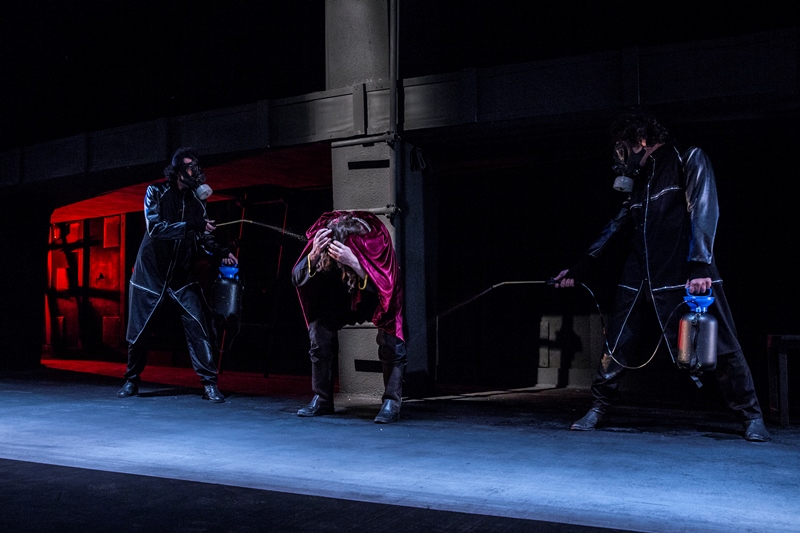
From right to left: Hesāmoddin Mokhtāri, Mehdi Bejestāni, and Shahāb Abbāsiān. Photo by Fahimeh Hekmatandish.
FK: Richard III Will Not Take Place was staged during a period of economic unrest and civil turmoil. How did that impact not only your production but also the attitude of the audience towards your work?
RJ: The protests were due to economic instability and the sudden inflation in the foreign exchange market. Despite this, they resulted in political interpretations by the press, which eventually led to a censored and limited coverage of it, as official governmental media outlets failed to cover the entire aspect of the protests. On the theatre stage, a similar space was present, but not of an economic kind; it was political.
I consider myself one with my community; thus, I’m not separate from society’s happiness and sadness. With that said, the selection of the works I stage can be a direct reflection of my personal thoughts and inquiries. In doing the dramaturgy for Vișniec’s work, I make sure to preserve his thoughts and desires, and it is in the selection of a proper text that audience members can create a bond with the performance and their world outside of the one seen onstage. Theatre, in a sense, is a mirror that reflects different aspects of society.
FK: Meyerhold’s biomechanics focuses more on motion rather than language and illusion. He also maintains plain costumes to enable better movement. How closely do you see yourself as following these principles in Richard III Will Not Take Place?
RJ: Biomechanics was only one of the many techniques employed in this play, as I didn’t want the play to be one-dimensional. I used biomechanics to create and develop the role of Meyerhold. For instance, in the scene in which Richard tries to convince Meyerhold to let go of his thoughts and wishes and to be as one with society, the lighting, mise-en-scène, movement, body language, dialogue formation, and tone were all in sync to portray biomechanics. Another reason for using biomechanics was to preserve a part of Meyerhold’s life onstage. Usually, an audience member who purchases a ticket for the play has not the slightest clue who Meyerhold is or what biomechanics is, so the goal of the Guitī Theatre Group was to display the political, societal, and historical aspects of Meyerhold’s life and of his theatrical techniques and viewpoint, in the hundred minutes of the production. Biomechanics was also a tool for portraying the tough governmental rule of the Soviet Union and Stalin. As for other characters and scenes, different techniques were utilized for the most optimized experience.
FK: Richard III Will Not Take Place was not nominated to be performed at the Fadjr International Theatre Festival of 2019. You have not received any feedback about why your work was not selected, and yet you are still pursuing a response – why is that?
RJ: The Guitī Theatre Group participated in the Fadjr International Theatre Festival in 2011 and 2012, but it is because of the misconceptions about my products that the group wasn’t nominated, even till 2019. Due to the universal thought and form of the play, the question was raised to the group whether they’d be willing to participate in the Fadjr International Theatre Festival. I disagreed with the idea immediately, but since I believe in team decision-making I let the group vote, and the majority favored participating in the Festival. The artistic director of the Fadjr Theatre Festival and the head of the International Section of the Fadjr Festival both claimed that Richard III Will Not Take Place is a selected and recognizable work in the past year (2018–19) and that it’s one of the most brilliant theatre productions in the past decade. They even proposed that it can be a good display of Iran’s theatrical capabilities to the international audience. However, in the course of the final selection and decision-making, Richard III Will Not Take Place was not nominated. I made many legal efforts to get a response about the demerits of my work and the reason for its disapproval. The head of the Theatre Festival told me that despite the play’s brilliance, it’s not common to have such a production in the Fadjr International Theatre Festival. Oddly enough, the head of the Festival even asked for my forgiveness! My goal was not to see my work or name on the list of nominees but to protest against the lack of respect and attention to the law. I even wrote a complaint to the artistic director of the Theatre Festival, and I received no response, yet again, as they explained that it wasn’t common to respond to such gestures. Thus, my goal is to raise these limitations in the production of works of art and the wrongful depositions that are present in my field and society at large.
I even had a sit-down with various journalists to voice my concerns to the public ear. I use the media because I believe that they are the open eye of society. The media are a powerful wing to an artist so that he can use them when he gets wrongfully abused. My inquiry on this subject continues, because when we don’t have set criteria for selection or clear guidelines and regulations, we do not have a set way of approaching art, which enables the law to be stepped upon in all forms and fashions. It also allows various foreign authorities – that have nothing to do with the world of art – to enter the field and create do’s and don’ts. The attitude towards Richard III Will Not Take Place and its elimination was a political one. As I said before, I will continue my inquiries until a clear response and explanation are received.
FK: Any plans for upcoming projects?
RJ: I am working on Vișniec’s latest play, MIGRAAAAANTS! There’s Too Many on This Damn Boat. The play is about migrants who have lost hope in their society and take the risk of migration and depart their homelands for a better tomorrow. Once again, Vișniec raises a universal issue, and he pays attention to topics that the universal man is facing. On another note, I can’t lose hope about re-performing Richard III Will Not Take Place. The actions and interpretations of the officials of the Fadjr International Theatre Festival towards the play are exactly the concept and notion that Richard III Will Not Take Place contained. Theatre is a governmental entity in Iran, and even private performance venues require governmental approval. I have written letters to the head of the Dramatic Arts Center in order to obtain a performance permit, but I have yet to receive a response. Verbally, they seem to have no issue with Richard III Will Not Take Place, but in action, it’s all a different matter. In the short performance period that we had, the play made deep connections with different viewpoints amongst the audience members, and they were able to see the relationship between Vișniec’s work and their own society and environment. Overall, Richard III Will Not Take Place received positive feedback and review, and the Guitī Theatre Group hopes to perform it again.
Café Cinema, Tehran, Iran, March 1, 2019
This post was written by the author in their personal capacity.The opinions expressed in this article are the author’s own and do not reflect the view of The Theatre Times, their staff or collaborators.
This post was written by Farinaz Kavianifar.
The views expressed here belong to the author and do not necessarily reflect our views and opinions.

